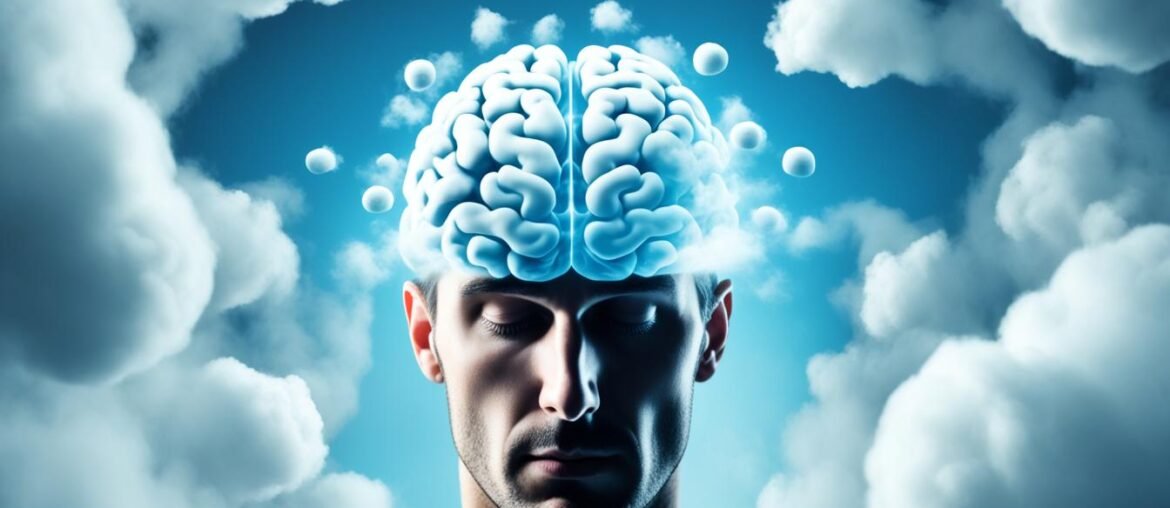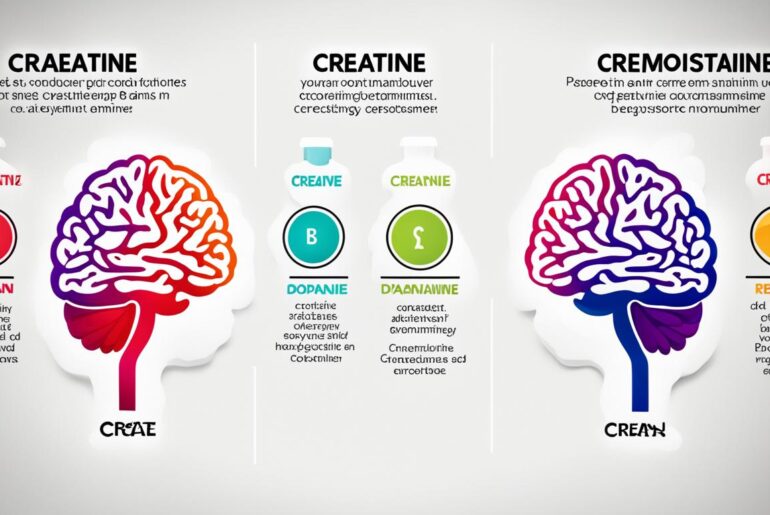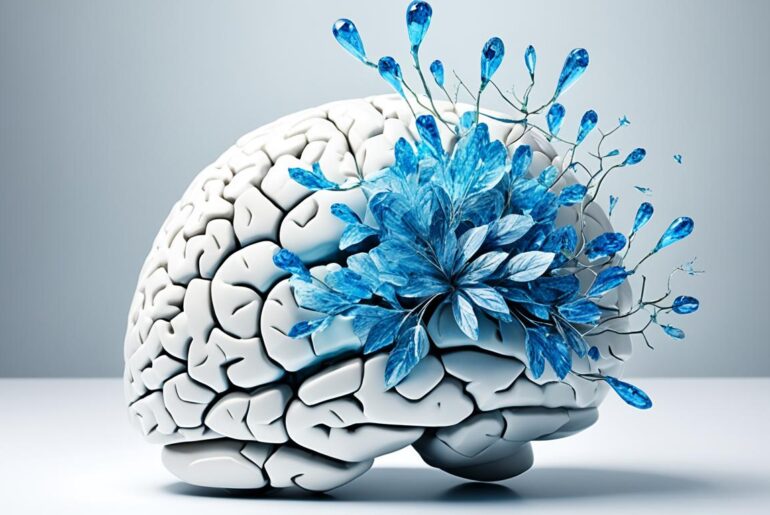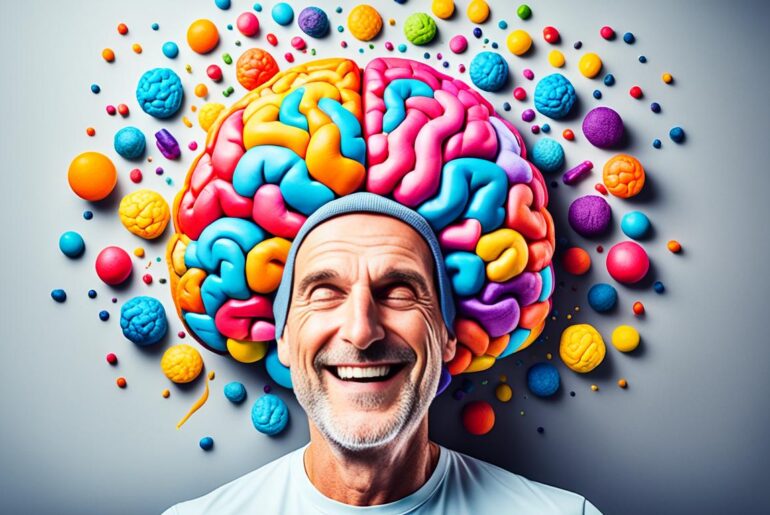It may come as a surprise to know that the supplement famed for increasing muscle mass and improving athletic performance has another trick up its sleeve—potentially clearing the mist from your mind. While many athletes load up on creatine for its physical benefits, recent discussions are pivoting towards how creatine synthesis influences cognitive functions, including mental clarity. What’s more, emerging inquiries into “does creatine help with brain fog?” are beginning to yield affirmative nods from the scientific community.
My interest in the subject sparked from a dual standpoint—a fascination with nootropic agents and a non-stop quest for peak mental performance. I’ve peered through the lens of countless journals and spoken with experts to earnestly understand the depth of creatine’s impact beyond the gym walls. It turns out, creatine supplementation for mental clarity could be a game-changer for those grappling with the haze of brain fog.
Key Takeaways
- Creatine supplementation may offer cogent benefits for cognitive clarity, not just physical performance.
- Investigations into the role of creatine in the brain present a compelling case for its use as a cognitive enhancer.
- Evidence suggests a possible reduction in brain fog symptoms with regular creatine use.
- The potential of creatine to support mitochondrial function has far-reaching implications for mental health.
- Further research is warranted to fully understand and optimize creatine’s influence on brain fog reduction.
Understanding Creatine and Its Role in the Body
As a journalist closely analyzing the multifaceted benefits of creatine, I’ve come to appreciate its significant role, not just in physical performance but in cognitive health as well. The substance is often touted for its ability to diminish brain fog and facilitate cognitive enhancement, but how exactly does it achieve this? Let’s delve into the science behind creatine and discover its pivotal functions in our body.
What is Creatine?
My investigation into creatine begins with its basic identity: a vital amino acid found naturally in our muscle and brain tissues. Its efficacy in enhancing cognitive function makes it a substance of great interest, particularly for those suffering from the disorienting effects of brain fog. It’s intriguing to note how this simple compound can impact mental clarity and cognitive processes.
Dietary Sources of Creatine and Its Synthesis in the Body
The body’s creatine reserves are a balance between external intake and internal production. Dietary sources, predominantly from animal products, provide approximately half of the body’s requirement. Meanwhile, the liver, kidneys, and pancreas contribute to creatine synthesis, making it a sustainable system within our biology. It is this harmonious balance that empowers individuals to attain cognitive enhancement with creatine, by maintaining robust levels via diet and endogenous production.
Creatine’s Primary Function as a Source of Cellular Energy
At its core, creatine’s primary role is to synthesize adenosine triphosphate (ATP), the energy currency that fuels cellular activity. This process is paramount to understand the benefits of creatine for brain fog and cognitive function. By boosting ATP production, creatine not only assists in muscular endeavors but also in enhancing brain energy metabolism, which is essential for maintaining mental acuity and cognitive enhancement.
In my continued exploration of the versatility of creatine, I realized the need to visually represent the intricate balance of its dietary sources, synthesis, and energy function. The table below captures the essence of how creatine sustains our mental and physical vigor.
| Creatine Source | Proportion | Role in Cognitive Function |
|---|---|---|
| Dietary Intake (Animal Products) | ~50% | Provides direct creatine to supplement cellular energy levels |
| Endogenous Synthesis | ~50% | Ensures a steady supply of creatine for ATP production |
| ATP Production | 100% (Whole Body) | Enhances energy availability for mental processes, reducing brain fog |
By anchoring our understanding in how creatine operates within the body, we gain insight into its potential for cognitive enhancement. It is not just a supplement for athletes but a beacon for anyone seeking to combat brain fog and optimize mental performance. As we continue to explore this compound’s profound effects, it’s clear that creatine and cognitive function are inextricably linked, presenting promising benefits that beckon further exploration and application.
The Storage and Utilization of Creatine in Muscles and the Brain

When considering the significance of creatine in the human body, its presence in skeletal muscles is paramount, making it a critical factor for increasing muscle strength with creatine, and a staple in creatine supplementation for athletes. The strategic reserves of creatine within the neurological and muscular systems lay the groundwork for its essential physiological roles, particularly in aiding muscle contraction and cognitive functions.
Distribution of Creatine Stores
The human body manages a delicate balance of creatine storage, ensuring optimal availability for both brain and muscle tissues. Muscle cells hoard the lion’s share of bodily creatine, accounting for approximately 95% of the total stores. This high concentration in muscles attests to creatine’s crucial role in the immediate regeneration of ATP, the energy source muscles call upon during high-intensity, short-duration exertions.
Influence on Skeletal Muscle Function
Within skeletal tissues, creatine is recognized for its direct impact on muscle strength and endurance. Athletes frequently turn to creatine supplementation to enhance their performance, tapping into the compound’s ability to facilitate repetitive, high-power output movements. With each weight lifted or sprint dash, creatine proves its worth, offering tangible benefits in training adaptability and potential muscular development.
As we consider the broader implications, it’s evident that creatine’s role transcends the realm of professional athleticism. The elderly and those averse to regimented exercise also stand to gain from creatine’s capacity to maintain and improve muscle function, reflecting its comprehensive utility and potential in promoting quality of life across various populations.
Exploring the Cognitive Benefits of Creatine
As a professional deeply engrossed in the conversations around cognitive enhancers, I’ve had the opportunity to delve into the role of creatine in reducing brain fog with creatine. Here, we find a supplement traditionally tethered to athletic performance breaking ground in the realm of cognitive health.
Impacts on Cognitive Function and Neurological Health
Emerging research has consistently pointed towards creatine as a brain fog remedy, boosting mental performance in scenarios ranging from everyday stress to rigorous cognitive demands. Notably, supplementation of creatine has been linked to enhanced cerebral blood flow, leading to improved oxygen utilization in the brain. This, in turn, is thought to mitigate the effects of mental fatigue.
Effects of Creatine on Aging Brain and Cognitive Decline
In the context of aging, a prevalent concern is the decline in cognitive abilities. My examination into the matter reveals that creatine clears the mists of ambiguity to showcase promise in preserving mental acuity. Its supportive actions in maintaining brain health emerge as a beacon of hope for those receptive to nutritional interventions for cognitive longevity.
Clinical investigations have illuminated creatine’s capacity to bolster Brain-Derived Neurotrophic Factor (BDNF), which stands vital for mental performance and is often implicated in the pathology of depression. With such a compound in our toolkit, we are witnessing a paradigm shift where the intersection of dietary supplements and mental wellness carves a new path for therapeutic exploration.
Given its cross-functional benefits, creatine not only serves as a cornerstone in the support of muscle tissue but also emerges as a formidable ally in our quest to understand and enhance brain function.
Furthermore, I have crafted a comparative analysis encapsulating the varying aspects of creatine’s cognitive effects, which highlights the potential accordance with both anecdotal experiences and scientific scrutiny:
| Cognitive Benefit | Description | Study Insights |
|---|---|---|
| Mitigates Mental Fatigue | Reduces the effect of sleep deprivation and stressful cognitive tasks | Supplementation of 8 grams for five days showed reduced mental fatigue |
| Enhances Oxygen Utilization | Improves brain’s oxygen uptake during demanding mental efforts | Correlation with enhanced performance in cognitive tests |
| Brain Health in Aging | Positively affects the brain’s resistance to cognitive decline associated with aging | Regular supplementation linked to better cognitive function in older adults |
| BDNF Support | Contributes to the production of a vital factor for mental health | Suggested improvements in mood and depression treatment strategies |
In essence, the narrative unfolding before us paints a compelling picture where creatine is not solely relegated to the realm of physical enhancement but is rapidly ascending as a venerated component of cognitive health interventions.
The Connection Between Creatine and Mental Clarity

As someone with a vested interest in enhancing cognitive functions, I’ve been intrigued by the burgeoning research around improving focus and concentration with creatine. This naturally occurring substance, although widely associated with sports nutrition, is proving to have profound effects on brain health. Many experts now suggest that creatine’s ability to step up cellular energy production is not limited to muscle fibers but extends to the neurons in our brains as well.
What makes mental clarity so elusive can often be traced back to the cellular level. Our brains require a tremendous amount of energy to maintain cognitive clarity, and even small deficits can lead to feelings of mental fogginess or lapses in memory. By bolstering the energy reserves in our brains, creatine supplementation may aid in warding off these deficits and promote a more alert state of mind. Here’s a closer look at how creatine could potentially boost mental sharpness:
- Increases in adenosine triphosphate (ATP) could lead to improved brain cell metabolism.
- Enhanced neurotransmission may result in quicker thinking and better problem-solving abilities.
- Heightened energy levels in the brain may alleviate symptoms of mental fatigue.
Below is a straightforward table laying out the purported benefits that creatine can have on the brain’s functionality:
| Aspect of Mental Clarity | Impact of Creatine Supplementation |
|---|---|
| Energy Metabolism | Increases the availability of ATP for neurotransmission |
| Brain Fog | May decrease instances of brain fog and improve clarity of thought |
| Memory Retention | Potentially assists in short-term memory and recall processes |
| Concentration | Improves ability to focus on tasks without mental fatigue |
While the correlation between improving focus and concentration with creatine is still under scientific scrutiny, the anecdotal and preliminary empirical evidence indicates we’re on the precipice of fully understanding its cognitive enhancements. Meanwhile, individuals like myself remain hopeful for yet another tool to sharpen our mental edges, reducing brain fog and enhancing overall mental clarity through the targeted use of this supplement.
Creatine Supplementation as a Potential Cognitive Enhancer
As a professional copywriting journalist, I’m continually exploring emerging trends in health and wellness, and one topic that has caught my attention is the use of creatine as more than just a muscle-building supplement. Emerging research has unearthed intriguing findings regarding cognitive enhancements from creatine supplementation effects. This has potentially significant implications for those looking to bolster their mental performance. Let’s delve into the science behind these claims and uncover how creatine could be a game-changer for the mind.
Research on Creatine’s Role in Cognitive Enhancement
My investigation into the cognitive repercussions of creatine supplementation led me to numerous studies illustrating its profound impact on mental function. Researchers are uncovering how creatine plays a critical role in maintaining energy levels in the brain, similar to its energy-boosting effects in muscle tissue. This parallels the idea that an energized brain is better equipped to handle cognitive demands, especially under duress.
How Creatine May Improve Focus and Concentration
In the fast-paced world we live in, the ability to concentrate and stay focused is invaluable. Studies suggest that creatine supplementation can help individuals sustain attention over extended periods. This is particularly relevant for tasks requiring prolonged mental exertion, where creatine’s effect on ATP production helps keep mental fatigue at bay.
The following table summarizes some of the key points from recent studies on creatine’s role in cognitive enhancements:
| Study Focus | Findings | Cognitive Impact |
|---|---|---|
| Creatine’s effect on memory and intelligence | Subjects showed improved performance on tasks requiring intense mental effort | Boosted short-term memory and reasoning skills |
| Impact of creatine on mental fatigue | Reduction in mental fatigue during demanding cognitive tasks | Enhanced overall focus and concentration |
| Creatine’s influence during cognitive stress | Improved cognitive performance during sleep deprivation | Resistance to impairment caused by sleep-related stressors |
These findings are persuasive in establishing creatine as more than a muscle-building aid—it’s showing promise as a robust cognitive enhancer as well.
Creatine’s Influence on Brain Fog Reduction
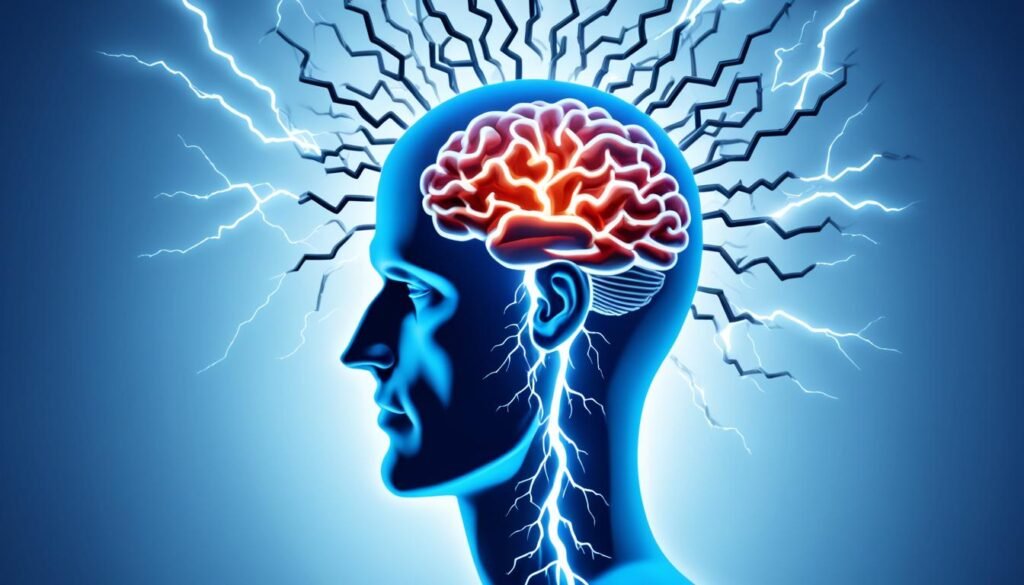
As someone who closely follows the latest developments in nutritional supplements, I’ve been intrigued by the ongoing research into creatine’s influence on cognitive performance. The compound is already well-known for its physical benefits, but its mental performance support is a burgeoning area of interest.
Scientific Evidence of Creatine Alleviating Brain Fog
Recent studies point to creatine’s effectiveness in combating the symptoms of brain fog, demonstrating an enhancement in overall cognitive function. What sets creatine apart as a nootropic is its ability to increase phosphocreatine levels in the brain, which in turn boosts the formation of ATP, the source of cellular energy. This energizing effect can result in a clearer mind and quicker mental processing.
Personal Experiences of Enhanced Mental Performance
The anecdotal evidence aligns with scientific findings; numerous individuals report a noticeable uplift in mental clarity following creatine supplementation. Skeptics may question the placebo effect, but controlled studies reinforce the narrative, establishing creatine as a significant contributor to alleviating brain fog and supporting cognitive health.
| Study | Subjects | Dosage of Creatine | Outcome |
|---|---|---|---|
| Rawson & Venezia, 2011 | Vegetarians | 5g/day | Improved memory and reaction time |
| Rae et al., 2003 | Young adults | 5g/day | Enhanced cognitive processing |
| McMorris et al., 2007 | Elderly individuals | 20g/day | Reduction in brain fog |
With benefits of creatine supplementation emerging in both academic circles and everyday life, it’s becoming increasingly clear that this popular sports supplement may also moonlight as a smart drug. As I explore the multifaceted roles of creatine, I’m continually fascinated by its potential to enhance not just muscle but the mind as well.
Anti-Inflammatory Properties of Creatine and Brain Health
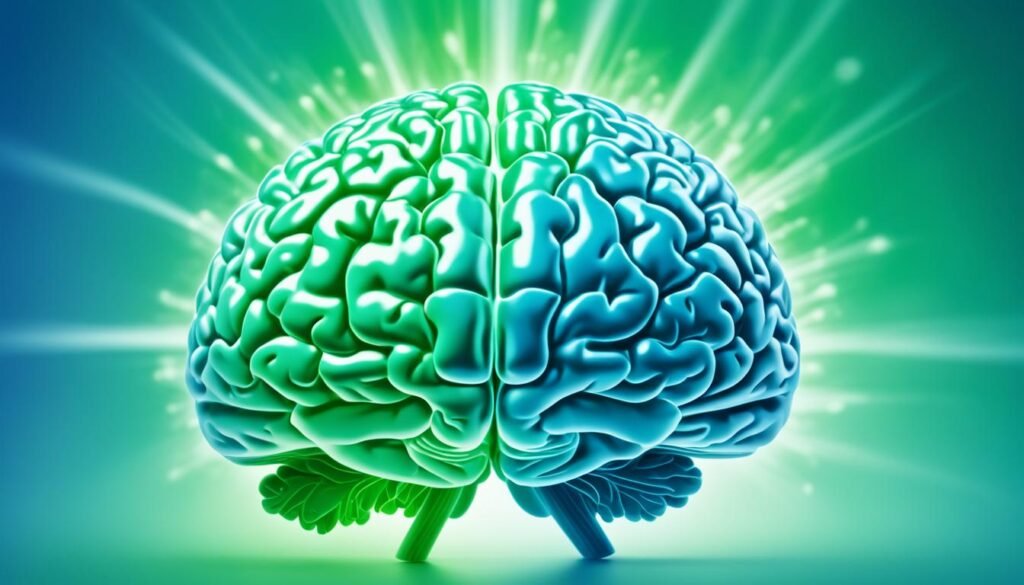
When we talk about creatine, we often focus on its role in muscle development and exercise performance. However, research has unveiled another critical benefit of creatine—it’s potential to combat inflammation within the body. This attribute holds significant implications for brain health and the management of cognitive symptoms, offering a holistic approach to wellbeing.
As a health-conscious individual, I understand that inflammation has a profound impact on cognitive functions, potentially exacerbating symptoms like brain fog and cognitive fatigue. This is where creatine steps in, evidencing a substantial reduction in inflammatory markers, which can translate to better brain health and cognitive performance.
Studies Linking Creatine to Reduced Inflammatory Markers
One study of note looked at endurance athletes, who often experience increased inflammation after intense bouts of exercise. The results suggested that those supplementing with creatine showed decreased levels of inflammatory markers, including tumor necrosis factor alpha. This indicates not just better muscle recovery, but also points to creatine’s anti-inflammatory effects that could benefit the brain.
Theoretical Insights into Creatine’s Anti-Inflammatory Effects
From a theoretical standpoint, the anti-inflammatory effects of creatine likely originate from its ability to optimize cellular function. Healthy cells mean a more controlled inflammatory response, which is essential for maintaining brain health and mitigating cognitive impairments. These insights offer a promising outlook for those managing cognitive symptoms with nutrition and supplementation strategies.
By exploring creatine not just as an energy booster but also as a protector against cognitive stressors, we unlock an exciting avenue for natural brain health support. It’s a reminder of the intricate links between physical and cognitive well-being and the power of dietary supplements to support both.
The Role of Creatine in Supporting Mitochondrial Function
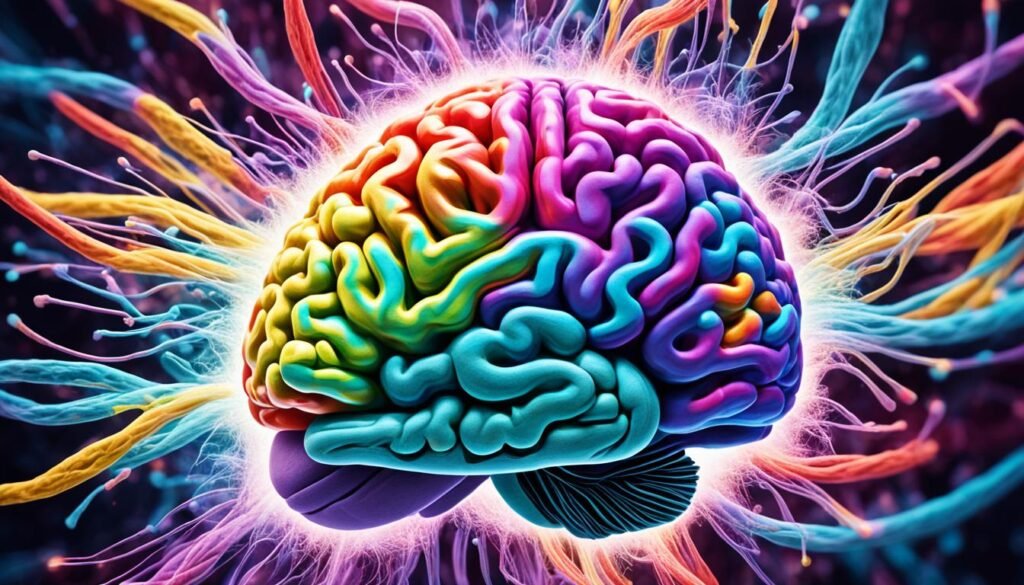
As we delve deeper into the strengths of creatine beyond muscle enhancement, it’s imperative to consider its capacity for mitochondrial support. The powerhouse of the cell, mitochondria play an essential role in energy production critical for maintaining optimal brain function and supporting our cognitive capabilities. In my exploration of creatine and its multifaceted nature, particularly in relation to cognitive health, the link between this dynamic molecule and mitochondrial function has emerged as a key focal point. Let’s investigate how creatine contributes positively to our mental faculties.
Why Mitochondrial Health is Crucial for Brain Function
It’s well-documented that our brain’s high demand for energy makes mitochondrial health a cornerstone for cognitive processes. These small organelles are not only responsible for ATP production but are also the guardians against cellular stress, which if unchecked, can contribute to cognitive decline. Ensuring the robustness of these biological dynamos is paramount for maintaining clear, sharp mental function and achieving improved cognitive results.
Creatine’s Impact on Mitochondrial Efficiency
The intrigue of creatine lies in its potential to provide mitochondrial support. It’s posited that creatine assists in maintaining mitochondrial integrity, offering a buffer against energy flux and contributing to the resilience of these energy-providing structures. The implications of this are striking, as prolonged mitochondrial health can be an ally against the oxidative stress known to impede cognitive performance. Therefore, regular supplementation of creatine could be seen as a proactive measure to not only support physiological functions but also fortify brain function.
| Benefit | Mechanism | Outcome |
|---|---|---|
| ATP Production | Enhanced Phosphocreatine Resynthesis | Sustained Cellular Energy |
| Cellular Integrity | Buffering Cellular Energy Levels | Reduced Oxidative Damage |
| Cognitive Support | Stabilization of Mitochondrial Membranes | Improved Cognitive Resilience |
In examining the revered role of creatine, it’s evident that its value extends beyond physical stamina into the realms of cognitive enhancement. We find that through its intersection with mitochondrial efficiency, creatine becomes a significant ally in our quest for a sharper, more focused mind.
Practical Tips for Creatine Supplementation

As we delve into ensuring optimal cognitive health, it’s essential to grasp the recommended creatine dosage for cognitive health and adhere to guidelines for creatine supplementation. Aligning with these recommendations not only aides in enhancing cognitive function but also plays a significant role in maintaining cognitive wellness.
Dosage, Timing, and Types of Creatine Supplements
The consensus among health professionals usually points towards integrating a daily amount of approximately 5 grams of creatine monohydrate into your diet. The precision in dosage and timing can be pivotal to maximizing its cognitive benefits.
- Initiate supplementation with a “loading phase” of 20 grams per day, split into 4 servings, for 5-7 days.
- Follow with a “maintenance phase” of 3-5 grams daily.
- For optimal absorption, consume creatine with a carbohydrate-rich meal or drink.
There are various forms of creatine available, with monohydrate being the most researched and widely touted for its efficacy and affordability. Other forms, such as creatine hydrochloride or ethyl ester, claim higher solubility and absorption, asserting you can use a lower dose.
Considerations for Long-Term Use and Overall Health Impact
Long-term supplementation should be approached with awareness of its impact on personal health. Regular monitoring of kidney function and staying hydrated is advised.
| Factor | Consideration |
|---|---|
| Frequency | Daily supplementation with periodic evaluations of its necessity |
| Medical Conditions | Consult a healthcare provider if you have a history of kidney disease |
| Hydration | Increased water intake to facilitate creatine metabolism |
| Nutritional Synergy | Pairing with carbohydrates or protein to enhance uptake |
Maintaining an informed perspective on creatine use empowers us to harness its full potential for cognitive enhancement while preserving overall health.
Conclusion
As we’ve delved into the intriguing world of creatine and its impact on cognitive function, it’s apparent that this supplement transcends its gym-fame to offer a beacon of hope for those grappling with the opaque curtain of brain fog. The summary of creatine’s cognitive enhancements is not just a narrative spun from hopeful anecdotes; it’s a tapestry woven with the threads of rigorous scientific inquiry. My analysis has revealed that creatine’s role in promoting mental clarity and combating cognitive fatigue is a significant breakthrough for individuals seeking a mental edge or battling with the foggy fatigue that often shadows our modern, hectic lifestyles.
Summary of Creatine’s Cognitive Benefits
In my journey through the current landscape of research, I’ve discovered that creatine supplementation is a key ally in the quest for improved cognitive outcomes. The collective evidence points towards a promising synergy between creatine, energy metabolism in the brain, and a marked reduction in the symptoms indicative of brain fog. Renewed focus, heightened concentration, and a notable uptick in cognitive resilience reflect the sheer potential this supplement harbors within its molecular structure.
Future Directions for Research and Application
Looking towards the horizon, it’s clear to me that future research on creatine’s benefits is imperative to navigate the nuanced terrains of mental wellness. Exploration into optimal dosing strategies, the longevity of cognitive improvements, and potential preventative roles in cognitive decline could open up new vistas in the realms of neuroscience and nutrition. By shedding light on these unknowns, we could refine creatine’s blueprint to fine-tune mental acuity, focus, and cognitive function across diverse populations, ensuring that this supplement’s full spectrum of cognitive benefits is realized and accessible to all who stand to gain from its neurological nurturing.
FAQ
Does creatine help with brain fog?
Yes, scientific research suggests that creatine supplementation may reduce symptoms of brain fog by increasing cellular energy production in the brain, which enhances cognitive function and mental clarity.
What is creatine’s primary function in the body?
Creatine’s primary function is to help produce adenosine triphosphate (ATP), which is the primary energy carrier in cells. This role is crucial for improving workout performance, recovery, and cellular processes in muscles and the brain.
Where is creatine stored in the body, and how does it influence muscle and brain function?
Creatine is mainly stored in skeletal muscles, with a significant amount also present in the brain. In muscles, it helps enhance strength and performance, while in the brain, it supports cognitive functions such as memory and attention.
How can creatine supplementation enhance cognitive performance?
Creatine can enhance cognitive performance by improving brain cell metabolism and neurotransmission, leading to better focus, mental clarity, and the ability to perform cognitively demanding tasks.
What are the cognitive benefits of creatine for an aging brain?
Creatine can slow cognitive decline associated with aging by supporting brain health, increasing mental stamina, and aiding in the maintenance of cognitive functions like memory and attention.
How does creatine improve focus and concentration?
By bolstering ATP levels in brain cells, creatine improves the energy availability, which is essential for sustained mental focus and concentration, especially under strenuous conditions.
What scientific evidence supports the use of creatine to alleviate brain fog?
Empirical studies and controlled research have presented evidence that creatine supplementation can significantly improve symptoms of brain fog, leading to better mental performance and cognitive processing.
Can creatine supplementation help with mental performance beyond reducing brain fog?
Yes, creatine supplementation can also enhance overall mental performance, including memory, intelligence, and resistance to mental fatigue, making it a useful cognitive enhancer.
Are there any anti-inflammatory benefits of creatine that can affect brain health?
Yes, creatine has exhibited anti-inflammatory properties in various studies, which can lead to lower levels of inflammatory markers in the body and support overall brain health.
How does creatine support mitochondrial function and why is this important for the brain?
Creatine helps maintain mitochondrial function and efficiency, which is vital for the brain as it ensures the energy required for cognitive processes is produced effectively.
What should I consider when supplementing with creatine for cognitive health?
When using creatine for cognitive health, consider starting with a daily dose of 5 grams and adjust as necessary based on personal health conditions. Be mindful of the type of creatine, the timing of your supplementation, and ensure to stay hydrated.

